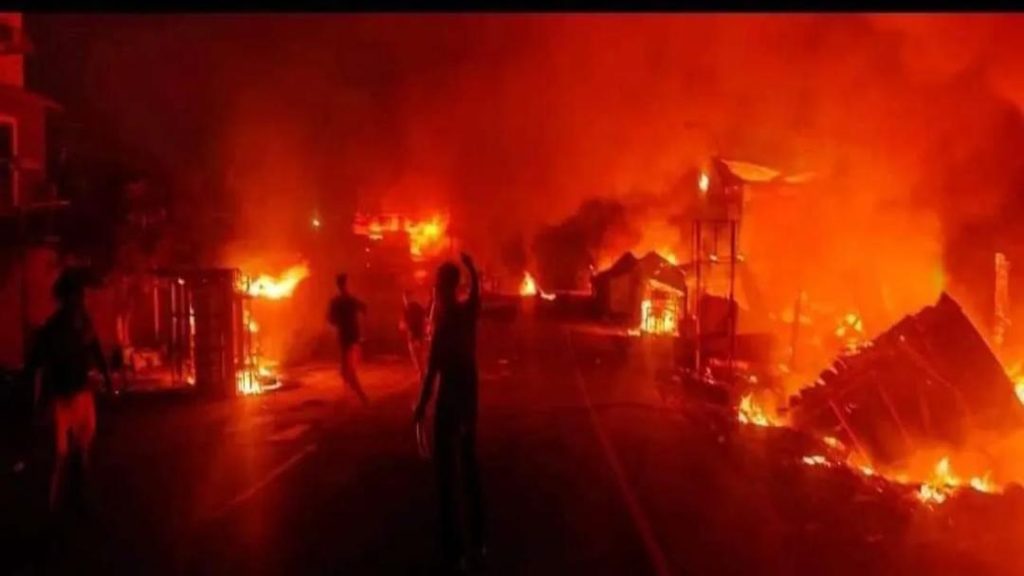
NIA Arrests Manipur Youth from Kannur in Ethnic Conflict Case
The National Investigation Agency (NIA) has made a significant arrest in connection with the ongoing ethnic conflict in Manipur. Rajkumar Mypaksana, a 21-year-old youth from Manipur, was taken into custody by the NIA on charges of being linked to the violence-plagued state. The arrest was made after a thorough surveillance operation that spanned several days.
Rajkumar was working at a hotel in Thalassery, Kerala, when he was tracked down to a rented house in Manjodi, Thiruvangad. The NIA officials, along with local police, conducted a joint operation to apprehend the accused, who was allegedly involved in the ethnic violence that has been wreaking havoc in Manipur.
The arrest of Rajkumar has raised concerns about possible militant links, which are a key factor in the ongoing tensions in Manipur. The state has been witnessing a surge in ethnic violence, with various groups vying for power and resources. The situation has been further complicated by the involvement of outsiders, who are believed to be fuelling the conflict.
Rajkumar’s arrest is a significant development in the ongoing investigation, which is being conducted by the NIA in coordination with local police. The agency has been probing the links between various groups involved in the violence, as well as the role of outsiders in perpetuating the conflict.
The NIA’s investigation has revealed that Rajkumar was in touch with several individuals who are suspected to be involved in the violence. The agency has also seized several electronic devices and documents from his possession, which are believed to contain incriminating evidence.
Rajkumar’s arrest has sent shockwaves through Manipur, where the ethnic conflict has been a major concern for several years. The state government has been trying to address the issue, but the violence has continued to spread, causing widespread destruction and loss of life.
The NIA’s arrest of Rajkumar is seen as a significant step forward in the investigation, which is expected to lead to more arrests and a better understanding of the complex web of relationships involved in the conflict. The agency has been working closely with local police to gather intelligence and track down suspects, and the arrest of Rajkumar is a testament to their efforts.
The arrest has also raised concerns about the involvement of outsiders in the conflict. The NIA has been investigating reports of foreign funding and training of militants in Manipur, which are believed to be fuelling the violence. The agency has also been probing the role of local politicians and businessmen who are suspected of having links to the militants.
Rajkumar’s arrest has also highlighted the issue of jobless youth in Manipur, who are often vulnerable to radicalization. The state has been plagued by unemployment, which has led to frustration and anger among the youth. The NIA’s investigation has revealed that many of the youths involved in the violence are unemployed and lack opportunities.
The arrest of Rajkumar is a wake-up call for the Manipur government, which needs to address the root causes of the conflict. The state government has been focusing on security measures, but the violence continues to spread. The NIA’s investigation has revealed that the conflict is not just a security issue, but also a complex social and economic issue that requires a comprehensive approach.
The NIA’s arrest of Rajkumar is a significant step forward in the investigation, but it is only the beginning. The agency needs to continue its investigation to uncover the truth behind the ethnic conflict in Manipur. The state government also needs to take concrete steps to address the root causes of the conflict, including unemployment, poverty, and social exclusion.
In conclusion, the NIA’s arrest of Rajkumar Mypaksana from Manipur is a significant development in the investigation into the ethnic conflict in Manipur. The arrest highlights the possible militant links and the involvement of outsiders in the conflict. The NIA’s investigation is expected to lead to more arrests and a better understanding of the complex web of relationships involved in the conflict. The Manipur government needs to take concrete steps to address the root causes of the conflict, including unemployment, poverty, and social exclusion.






